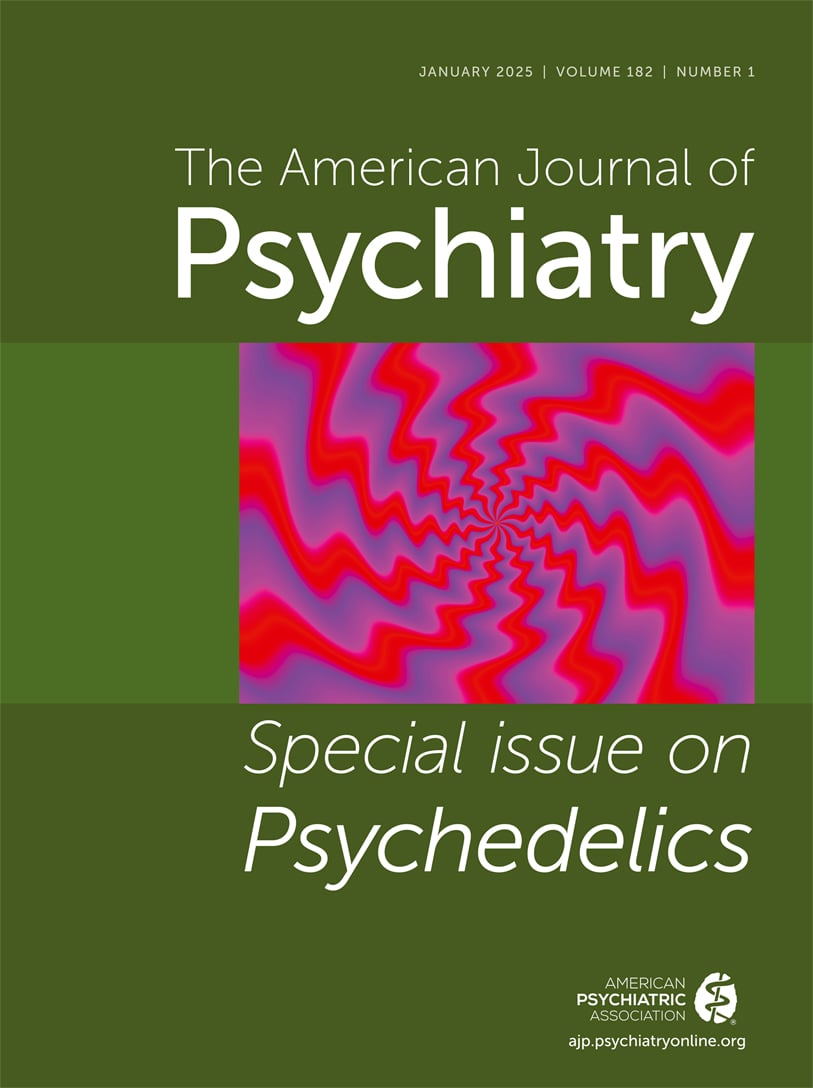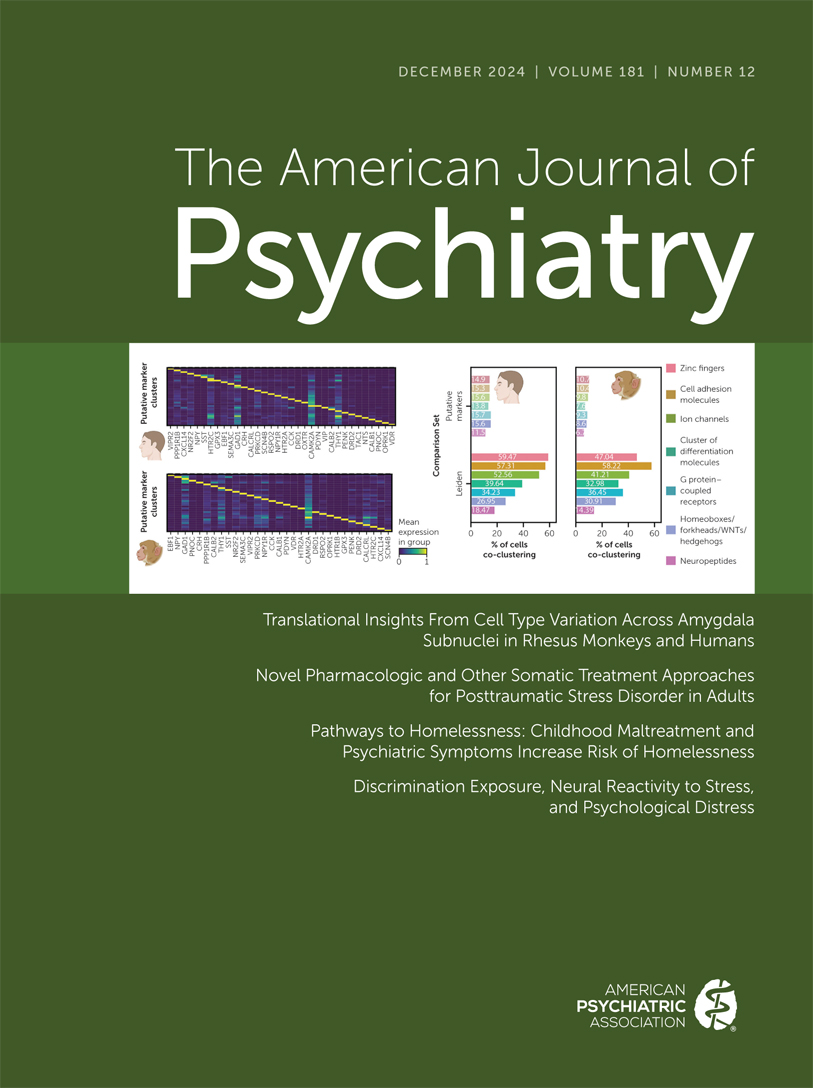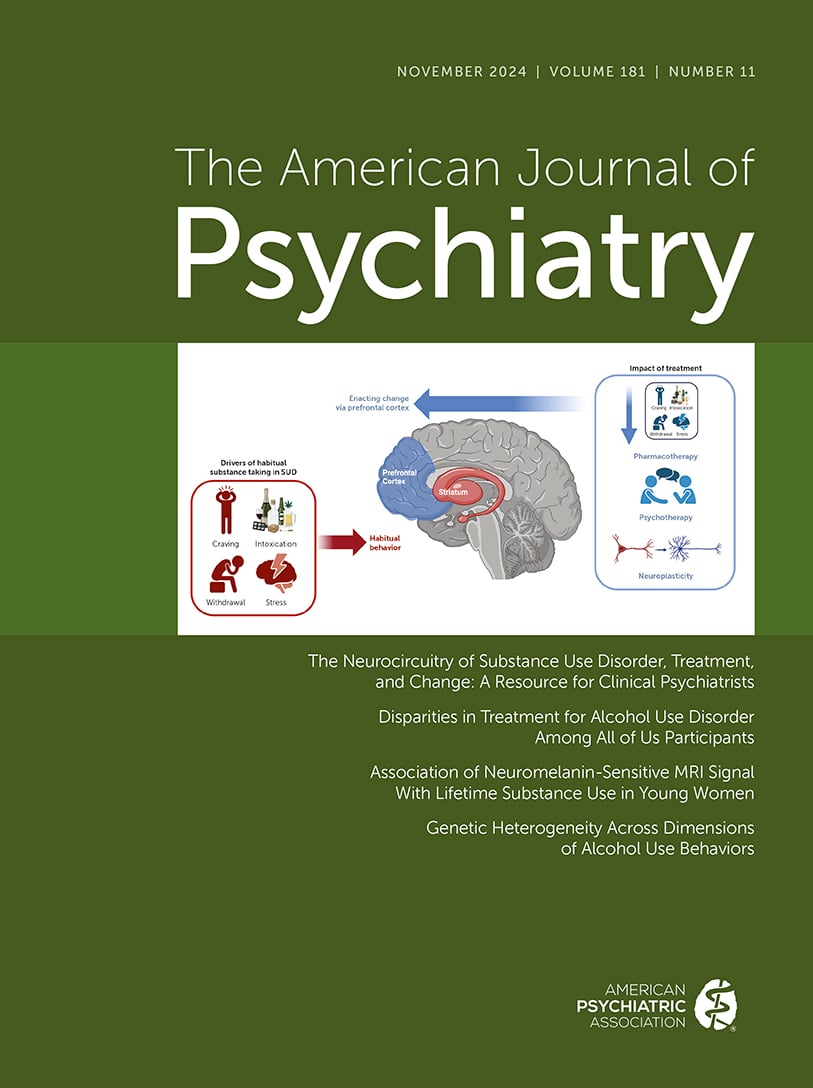American Journal of Psychiatry
- Volume 125
- Number 8
- February 1969
Article
Publication date: 01 February 1969
Pages1005–1012The author describes the opposition to community mental health that has developed among various professional and nonprofessional groups, indicating the reasons for their opposition. He believes that while coalitions will develop among several of the ...
https://doi.org/10.1176/ajp.125.8.1005Publication date: 01 February 1969
Pages1013–1023Alternative pathways to traditional graduate education and the national emergence of community college curricula leading to associate of arts degrees in a variety of human service fields are discussed in relation to Maryland's mental health technician ...
https://doi.org/10.1176/ajp.125.8.1013Publication date: 01 February 1969
Pages1024–1031Social, or folk, typing can be used to identify individuals who occupy relatively undifferentiated social positions and thus cannot be adequately distinguished from other members of a collectivity by means of role characteristics. The author discusses the ...
https://doi.org/10.1176/ajp.125.8.1024Publication date: 01 February 1969
Pages1032–1039DSM-II subdivides behavior disorders of childhood and adolescence into seven categories: "hyperkinetic reaction," "withdrawing reaction," "overanxious reaction," "runaway reaction," "unsocialized aggressive reaction," and "group delinquent reaction," plus ...
https://doi.org/10.1176/ajp.125.8.1032Publication date: 01 February 1969
Pages1040–1047Physical illness or trauma often leads to psychiatric complications sufficiently complex to require psychotherapeutic intervention. The authors have found brief psychotherapy to be especially suitable in such cases. They emphasize three techniques they ...
https://doi.org/10.1176/ajp.125.8.1040Publication date: 01 February 1969
Pages1048–1056The author reports a study of orientational percept (OP) distortions using 20 depersonalized and derealized patients and matched controls. His findings tend to support a heuristic theory of abnormal (verbal) behavior relating reports of OP distortions to ...
https://doi.org/10.1176/ajp.125.8.1048Publication date: 01 February 1969
Pages1057–1062A adequately designed hospital environment is essential to the aim of humanizing psychiatric treatment and making it more effective. The authors cite studies which give some basis for recognizing an environmental influence on behavior but note that there ...
https://doi.org/10.1176/ajp.125.8.1057Publication date: 01 February 1969
Pages1063–1066Earlier studies of the effectiveness of metronidazole in treating alcoholism have reported divergent findings. The authors tested the drug vs. placebo in a long-term, double-blind study of 100 alcoholic patients; the drug failed to demonstrate a ...
https://doi.org/10.1176/ajp.125.8.1063Publication date: 01 February 1969
Pages1067–1073Freud's background included many significant sources of contact with traditional Jewish scholarship. From this background, in part, his intense rational and analytical approach to psychology undoubtedly originated. The author notes remarkable similarities ...
https://doi.org/10.1176/ajp.125.8.1067Publication date: 01 February 1969
Pages1074–1082Although institutions may take impressive steps to safeguard the physical health of their highest decision-makers, they tend to ignore and in fact exclude provision for safeguarding vital interpersonal needs. The successful executive experiences a ...
https://doi.org/10.1176/ajp.125.8.1074Publication date: 01 February 1969
Pages1083–1092There is a great need to deepen our understanding of the psychological forces which motivate individuals whose actions in the public sphere affect the lives of all of us. T. E. Lawrence, because of an extraordinary gift of psychological insight and a ...
https://doi.org/10.1176/ajp.125.8.1083Publication date: 01 February 1969
Pages1093–1098The illnesses and suicides of James Forrestal and John Winant are examined for their possible relevance to problems of stress and breakdown in political decision-making areas. The depressions of Forrestal and Winant are related to their personal lives and ...
https://doi.org/10.1176/ajp.125.8.1093Publication date: 01 February 1969
Pages1098–1107Thomas Jefferson achieved what the author considers an extraordinary mastery of his life, which was, however, not devoid of conflicts. Dr. Binger describes Jefferson's inner struggle relating to the separation of the colonies from Britain, his depressive ...
https://doi.org/10.1176/ajp.125.8.1098Publication date: 01 February 1969
Pages1112–1115In the early 1950s it seemed that existentialism was destined to have a major influence upon American psychiatry. The authors assess the important professional changes which have occurred during the last decade and describe existential influences upon ...
https://doi.org/10.1176/ajp.125.8.1112Publication date: 01 February 1969
Pages1115–1119The test of an individual's growth is his capacity to relate effectively and intimately to significant others. A challenge in adult life is to achieve a marriage that contains creative communication. It is necessary for an individual to be intact as a ...
https://doi.org/10.1176/ajp.125.8.1115Publication date: 01 February 1969
Pages1120–1122Questionnaires were sent to 151 members of the Nassau Neuropsychiatric Society and to 184 members of the Royal Medico-Psychological Association in Scotland regarding attitudes toward psychotherapy and the extent of its use in psychiatric practice. The ...
https://doi.org/10.1176/ajp.125.8.1120Publication date: 01 February 1969
Pages1123–1127Two groups of chronic schizophrenic patients were treated with intensive psychotherapy for a period of two years, starting in 1962 and 1964. Half of the patients also took phenothiazines. Control groups at a local state hospital received phenothiazines ...
https://doi.org/10.1176/ajp.125.8.1123Past Issues
View Issues Archive
Vol. 182 | No. 1

Vol. 181 | No. 12

Vol. 181 | No. 11
